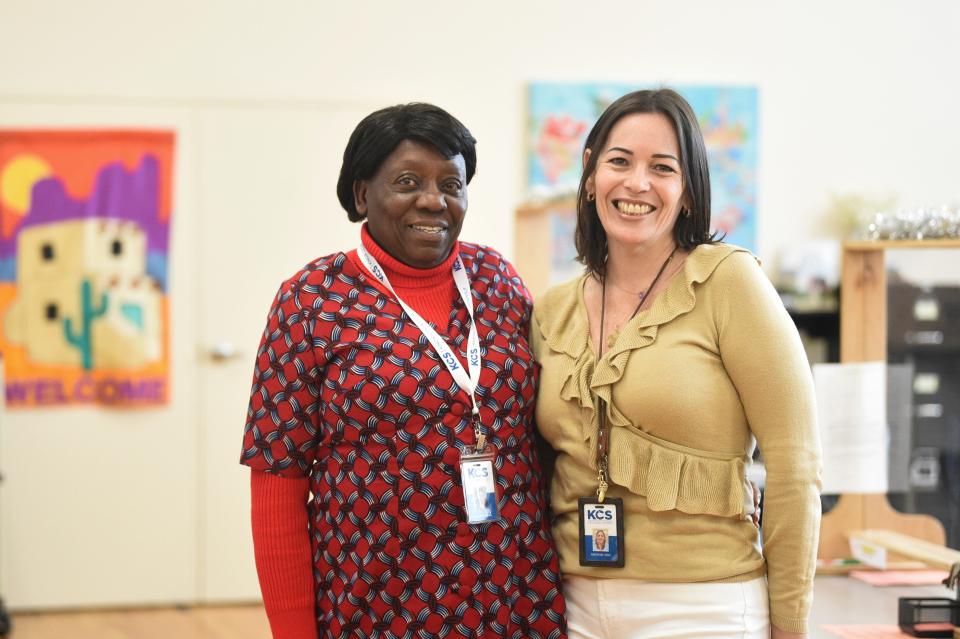Wondering how diverse Knox County Schools are? Its students speak 130 languages
Tennessee has all four seasons, unlike the only two Charlotte Rufyiri had ever experienced: dry and rainy.
Rufyiri is from Burundi, a small country in East Africa, and she speaks English, French, Kinyarwanda, Kirundi and Swahili. Burundi erupted into a civil war in 1993, and Rufyiri finally escaped in 2001. She made Johnson City her first American home.
In 2007, she was in the middle of working toward her master's degree at East Tennessee State University when she came across a Knox News article about refugees moving from Tanzania to Knoxville. She immediately dropped everything to help, even quitting her degree work to serve as an interpreter and translator.
"I'm a part of them. I'm like them; I've been a refugee myself," Rufyiri said. "I know what they're going through. We understand their culture ... it really helps."
Deep down, she knows the trauma some Knox County Schools immigrant families have experienced, and through her work with the district helps them feel at home navigating the complexities of the American school system. She has been working for the district for 11 years now.
Mairene Siso understood too, from personal experience, how complicated school systems can be. Siso is from Venezuela and speaks two languages: Spanish and English.
She moved to Knoxville with two young sons - one in ninth grade and one in seventh - and found herself feeling lost in the foreign land.
In Venezuela, teachers rotate between classrooms and the students stay put, Siso said. Here, the children are the ones who walk between classes. It was one of the many differences she had to understand without much context.
"The process for me was very hard," Siso said. "As a mom, I was completely lost."
If she sees somebody struggling with English in public places like grocery stores, she offers to help.
On a typical day, Rufyiri and Siso work with families to enroll their students and fill out the many required forms. They chat about immunization requirements and translate notes sent home by the school.
They're also available if a student is in crisis. The interpreters have a calming effect if they can personally speak to the distressed students in their native language, Rufyiri said.
"When I greet them in Spanish," Siso said, "their faces just light up."
It could be something as simple as saying, "Good morning," she added.
They don't leave until they're sure the student is OK.
How the Knox County Schools Welcome Center serves families
The welcome center on Chickamauga Avenue opened in 2017. It is the first place families with limited English proficiency go when they arrive in Knox County.
The center has 12 family community liaisons in addition to the district's English language learner teachers and coaches.
Over 5,100 students are served by the center. This semester alone, the center enrolled 942 new students, according to data shared by district spokeswoman Carly Harrington. Among the more than 60,000 students enrolled in Knox County Schools, students speak 130 languages other than English.
Some are widely spoken, such as Spanish and French, while others are a bit rare, such as Chamorro, spoken in Guam, a tiny island country in Micronesia. Only about 47,000 people worldwide are estimated to speak Chamorro.
The center also helps refer families to adult English language classes, citizenship classes and health clinics. In addition to helping families, they also guide other district personnel on relevant cultural context to help families adjust.
Life in Tennessee
Other than getting to experience all four seasons, both Siso and Rufyiri call Tennessee home because people are kind here, they said.
"American people here in Tennessee, in Knoxville are very nice," Siso said. "Everywhere I go, I never feel rejected."
Rufyiri loves that she can use so many of the skills she picked up as a child, including learning English in high school so well she won a volume of Shakespeare for her efforts.

Those little experiences can help bridge cultural gaps.
She knows from experience that African parents don't understand why they have to go to school for so many meetings, Rufyiri said.
"But when I explain it, they understand. They like meeting the teachers then," she said.
Areena Arora, data and investigative reporter for Knox News, can be reached by email at areena.arora@knoxnews.com. Follow her on X, formerly known as Twitter, @AreenaArora.
Support our newsroom's exclusive, in-depth local coverage by subscribing at knoxnews.com/subscribe.
This article originally appeared on Knoxville News Sentinel: Wondering how diverse Knox County Schools are? Its students speak 130 languages

